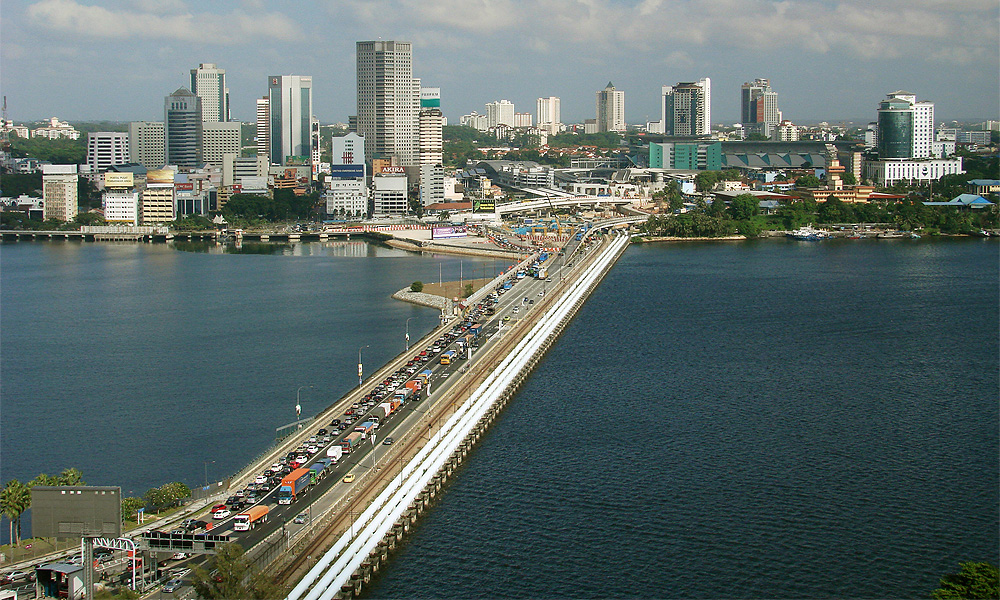
GE14 | For two years, Adiq Mohd Nor made the more than 50km journey on his trusty motorcycle, daily, from his hometown of Kulai in Johor to Singapore, hoping to earn a better living.
The 25-year-old studied maritime management in Terengganu but upon graduation, he couldn't find a suitable job in Malaysia. He now works with a Singapore firm specialising in fire alarms.
Every work day, Adiq wakes up at 4.30am and hops onto his motorcycle to head to the Sultan Iskandar Customs, Immigration, and Quarantine Complex (CIQ) in Johor Bahru.
He is one of the thousands of Malaysians who brave the crowded kilometre-long causeway over the Johor Straits before dawn on weekdays.
After passing through the Malaysian checkpoint, Adiq must then clear the Woodlands checkpoint on the Singapore side before he can reach his workplace.
"Passing through the Customs normally takes one hour. Sometimes it would be faster to just walk across the Causeway," he told Malaysiakini.
The many Malaysians commuting between the two countries will have to repeat the same process in the evening as they return home from work.
The mad rush eventually took a toll on Adiq, who finally decided to just rent a room in a Singapore despite the high cost of accommodation in the city-state.
Different living standards
But for Adiq, earning in Singapore dollars, which is three times higher than Malaysia's currency, makes it worth it.
"Because the currency and standard of living are very different in Singapore. For example, even with a salary of S$1,000, it is enough for food, expenses and savings.
"If in Malaysia, RM1,000 isn't enough even for a single person. The standard of living differs," he said.
Adiq earns S$1,600 (RM4,800) a month and is able to save up a quarter of the sum monthly.
Another woman, who only wanted to be known as Mastura, told Malaysiakini that she had been braving the causeway for 13 years.
Mastura works as a barista at a McCafe outlet in Bukit Panjang, Singapore, where she earns S$2,000 (RM6,000) a month.
A native of Jasin, Malacca, Mastura had to move to Johor Bahru in order to make working in Singapore possible.
But unlike Adiq, Mastura said she couldn't afford to rent a place in Singapore as a substantial sum of the money she earned had to be used to support her family.
"My father passed away and I am the eldest daughter in the family.
"I have to take care of my mother. Some of my siblings are also still schooling," she said.
Mastura lives in a low-cost apartment in Johor Bahru which is only about four kilometres away to the causeway.
Despite this, Mastura has to wake up at 3am every day as she must be at her workplace by 6am.
Both Adiq and Mastura said their employers have granted them the day off so that they can cast their votes in the 14th general election on May 9. Both declined to reveal their vote preference.
Changing demography
According to a Home Ministry parliamentary written reply to Kluang MP Liew Chin Tong, dated in June 2014, some 300,000 people cross the Johor Causeway and the Malaysia-Singapore Second Link on a daily basis.
This reality has also altered the electoral demography of southern Johor as it saw large numbers of Malaysians from other states settling there and crossing the causeway for work.
This is particularly true for parliamentary constituencies in the greater Johor Bahru, comprising Kulai, Gelang Patah (renamed Iskandar Puteri), Pulai, Tebrau, Pasir Gudang and Johor Bahru, which are generally mixed race seats.
Two of these parliamentary seats - Kulai and Gelang Patah - fell to the opposition for the first time in the last general election as Chinese voters in Johor decisively voted against the ruling coalition.
BN won the remaining four seats as Malay voters largely stuck with the ruling coalition, but with significantly reduced majorities.
BN won Pasir Gudang by 935 votes, Tebrau by 1,767 votes, Pulai by 3,226 votes and Johor Bahru by 10,135 votes.
In that election, 10,728 voters in Pasir Gudang, 14,728 in Tebrau, 16,598 in Pulai and 12,604 in Johor Bahru did not vote. The election outcome may have been different had they voted.
'Malays too turning to S'pore'
However, DAP's incumbent Johor Jaya assemblyperson Liow Cai Tung believes that the Malay ground is also shifting. Johor Jaya is a state seat under the parliamentary constituency of Pasir Gudang.
Pressured by stagnant wages, Liow said many Malays, like Adiq and Mastura, have turned to Singapore for work.
"More Malays are now going to work in Singapore due to low wages and rising cost of living in Malaysia," she said.
Pakatan Harapan believes such voters are more likely to be dissatisfied with the state of affairs in Malaysia and may favour the opposition.
This belief can only be tested in the 14th general election but statements by some BN leaders, apparently discouraging Malaysians working in Singapore from returning home to vote, may offer some indication.
The Election Commission (EC) had set a midweek polling day, on May 9, a Wednesday.
The government declared May 9 a public holiday after public outcry but prior to that, BN's incumbent Pulai MP Nur Jazlan Mohamed had lobbied against such a move.
However, the Malaysian public holiday has no impact on Singapore and it will largely depend on the goodwill of firms there to offer their Malaysian employees an off day to vote.
Nur Jazlan had also said that it was wrong for the opposition to use outstation voters to influence the results of the election.
Nur Jazlan later clarified that he wasn't stopping anyone from voting but was merely pointing out the opposition's purported "cheating".
BN deputy president Ahmad Zahid Hamidi, during a visit to Kluang, Johor last week, also said it was best for Malaysians working in Singapore not to return to vote if they couldn't get leave. - Mkini


No comments:
Post a Comment
Note: Only a member of this blog may post a comment.